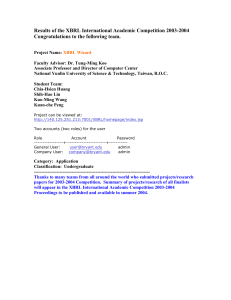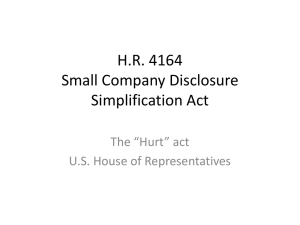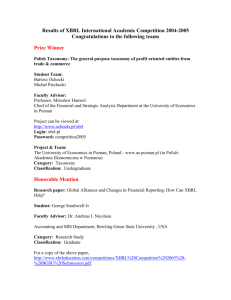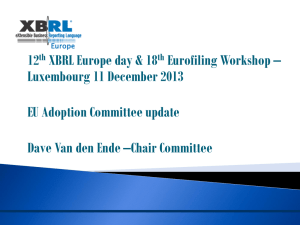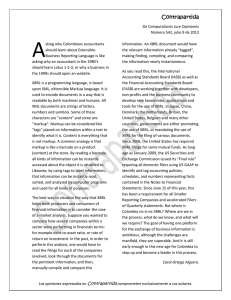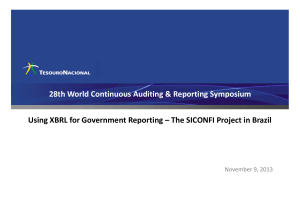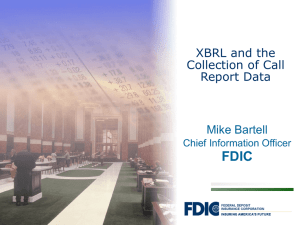Industry Framework and Applications for Business Reporting Semantics Joint XBRL-OMG Project
advertisement
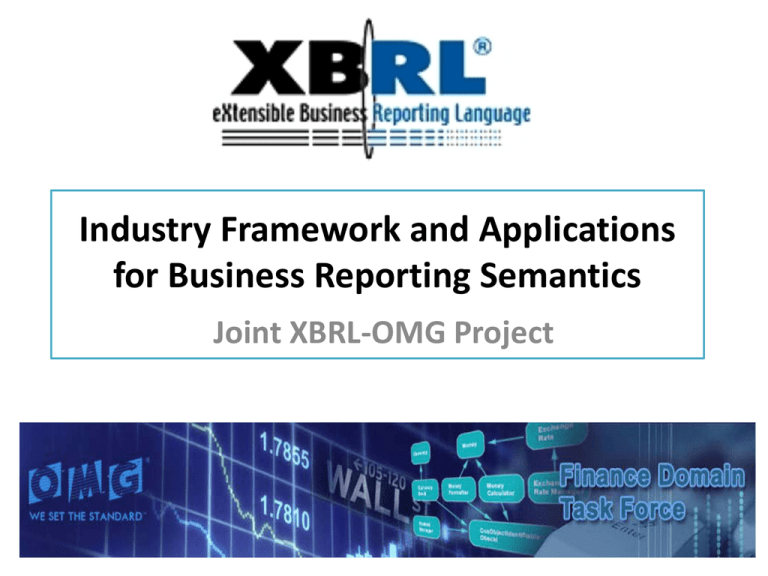
Industry Framework and Applications for Business Reporting Semantics Joint XBRL-OMG Project Index • XBRL Semantics Framework & Cloud: Executive Summary • Business Drivers • XBRL Semantics Framework: Major Components • What is being developed? XBRL Semantics Cloud • Next Steps • Appendix 2 XBRL Semantic Framework and Cloud: Executive Summary WHAT WHY • Joint XBRL-Object Management Group project • Defines next generation framework for business information reporting and analytics • Framework supports ecosystem of private, public sector organizations & academics • Framework to be housed in OMG standardsbased ‘XBRL Semantics Cloud’ DRIVERS OF THE NEED • Information is the lifeblood of business; 24x7x365 need for business information across the world – there is no downtime • Need to derive competitive insight from ‘raw data’ across multiple tools and systems to improve business operations and meet regulatory obligations • Abundance of data (data explosion) from heterogeneous systems • Standards for business reporting are in use but seamless interoperability of data and consistency of semantics continues to be an elusive goal • Availability of business reporting data ‘linked’ with ‘other’ data in consumable format BENEFITS DESIRED • Availability of global public cloud for managing life-cycle of XBRL taxonomies/related standards • Opportunity for vendors/consultants to provide ‘value added services’ leveraging industry standard taxonomies and models from public cloud • Consistency of business information across the enterprise and partners • Reuse of models and option to generate code allowing flexibility in choice of technology platforms • Clarity on what type of models, taxonomies, standard formats are best suited for what type of business applications and stakeholders • Public cloud allows web based access to all XBRL related semantics • Private cloud(s) with ‘value added services’ that leverage semantics from public cloud with added semantics for specific business applications & services HOW • Follow OMG standards development process • Phase 1 (Definition Phase): Joint Project Charter, Scope approved by OMG and XBRL Board; XBRL Semantics Framework as a joint XBRL-OMG standard; Candidate Business Application to demonstrate applicability of framework • Phase 2 (Public Cloud Development Phase): Cloud demonstrating applicability of selected business application in public cloud for XBRL Semantics • Phase 3 (Public Cloud -Execution phase): Public cloud access to broader ecosystem with selected XBRL semantics (abstract model, other taxonomies, formats…) • Phase 4 (Private Cloud definition/execution phase): Private Cloud: value added services; business model for value added services WHO • XBRL members (e.g., software vendors, consulting firms, banks, regulators) • OMG members (e.g., software vendors, end-users) • Academics • Regulators, other government agencies 3 Business Drivers • Link current business and financial reporting data with sustainability reporting, corporate actions data, and additional frameworks tat demonstrates the relationship between better corporate governance and the financial condition of a company or organization • Provide an open, public cloud with a browser interface to search, discover and use all XBRL taxonomies and other semantics to expedite adoption and implementation (See Aberdeen Research March 2012 – “Taking XBRL and Financial Disclosure Management to the Cloud”) • Provide opportunities for XBRL consultants, system integrators, and XBRL tool providers to offer additional services utilizing the XBRL semantics repository in the public cloud • Sustainable way to manage all XBRL semantics (business vocabularies, abstract models, message formats, calculation rules etc.) by using the public cloud (See Aberdeen Research March 2012 “Taking XBRL and Financial Disclosure Management to the Cloud”) 4 XBRL Semantic Framework Framework Consumers Private Sector (lines of business, global functions ) Standards Organizations Private Sector (software, hardware vendors, SIs, Consultants Architects, Modelers and Data mgmt staff Public Sector (regulators, government agencies) XBRL Speech Communities in Business Natural Language (BNL) (business definitions, context, rules) Financial Reporting BNL Prudential Reporting BNL Sustainability BNL OMG Business Vocabulary, Rules, date/time modeling languages Technology Agnostic Semantic Models (Process, Events, Data) OMG-EDMC Financial Business Ontology (FIBO) XBRL Abstract Model (Metamodel) XBRL Process & Event Models OMG Business Process, Events, Semantic modeling languages Sustainability Reporting Models IT, Data mgmt Academics XBRL Registries (Functions, Data Types, Units…) Implementation Models XBRL Reports (production) XBRL Report Taxonomies US GAAP, IFRS, COREP, FINREPAccounting, CL China Listed,Funds…. XBRL Consumption (incl. BW/BI) OMG Events, System, Information modeling languages Implementation/Exchange Formats XMI XML RDF OWL DDL SQL XBRL Reporting Formulas Transformation Maps OMG and other interchange/interoperability formats Traceability, Impact Analysis Maps Business SMEs, Decision Makers, Architects and IT NGOs Other 5 What is being developed? XBRL Semantics Cloud Standards Organizations Private Sector Regulators Lines of business, global functions (HR, Legal, Finance, Risk/compliance…) Governments Private Clouds Public Cloud XBRL Semantics Portal • Search, discover, update XBRL Semantics • Canned, ad-hoc reports XBRL Semantics Repository • Business Nomenclature (smart vocabularies) • Abstract Models (Metamodels, Process, Events) • XBRL semantics Taxonomies (Fiinancial, Prudential, Sustainability Reporting etc.) • OLAP based warehousing intelligence • Implementation models (ETL, schemas, cube technology, schemas) • Semantics exchange formats, report formats (XML, RDF, OWL, SQL, other…) Value Added Services provided by software vendors, SIs, consultants to private and public sector/governments End-users OMG modeling and domain standards Academics Open Cloud Contributors • OMG, XBRL community, other Standards Organizations, Academics, Private sector (including Public Cloud provider) • Define, validate & manage framework, semantics using OMG standards governance process • Establish & maintain Public Cloud Environment 6 Next steps Validate business drivers and commitment from XBRL, OMG leadership Identify highvalue business application of the framework Conduct Pilot to validate the concept, tools, models in public Cloud Launch Public Cloud Identify value added-services for private Cloud 7 Appendix 8 XBRL ecosystem and Assurance Cases • XBRL Business Technology facilitates using structured arguments to justify regulatory compliance claims. – In the form of assurance cases, combining auditable claims, arguments that connect claims to subclaims and further to evidence – Assurance case demonstrates the satisfaction of the regulatory compliance claims by using semi-formal reasoning (substantiative reasoning, Toulmin) • Assurance case communicates the connection between complex analytics and data collection and transformation activities and demonstrates how these activities justify the business level claims – Provides enhanced transparency – Provides traceability between high level regulatory objective and business/physical data • The XBRL framework facilitates management of evidence in support of compliance or reporting claims 9 Confidence Building: Assurance Case Example Regulatory Objective Argument 10 Confidence Evaluation: Level of confidence that objective is met Regulatory Objective Argument Evidence 11 Business Drivers • Creating an XBRL Specification Abstract Model will remove some of the obstacles to development of XBRL software tools, provide a blueprint for creating XBRL applications, and attract more independent software vendors to the community. More tools also mean more choice for the marketplace – something for which users of XBRL tagged data have been asking • As newer technologies emerge and are evaluated for their ability to add value to the XBRL standard, the abstract model can also play a key role to help developers both understand the impact of new technologies on XBRL as well as the impact of XBRL on the design and evolution of that new technology. • To more effectively provide XBRL implementations in various jurisdictions – a UML Model (Standard created by OMG) should be deployed by regulators, government agencies, corporations and others as a “best practice” for better management of XBRL projects. The UML model will help entities better manage resources and more effectively meet the needs of stakeholders for XBRL projects. • XBRL is one of many industry specific XML languages. OMG facilities the use of metadata tagging that can be linked to XBRL data to create better interoperability with other XML efforts – meaning XBRL data can will become “smarter data” that can be used on a global basis in the marketplace using OMG global standards which will enhance XBRL use in the marketplace and expedite adoption 12
